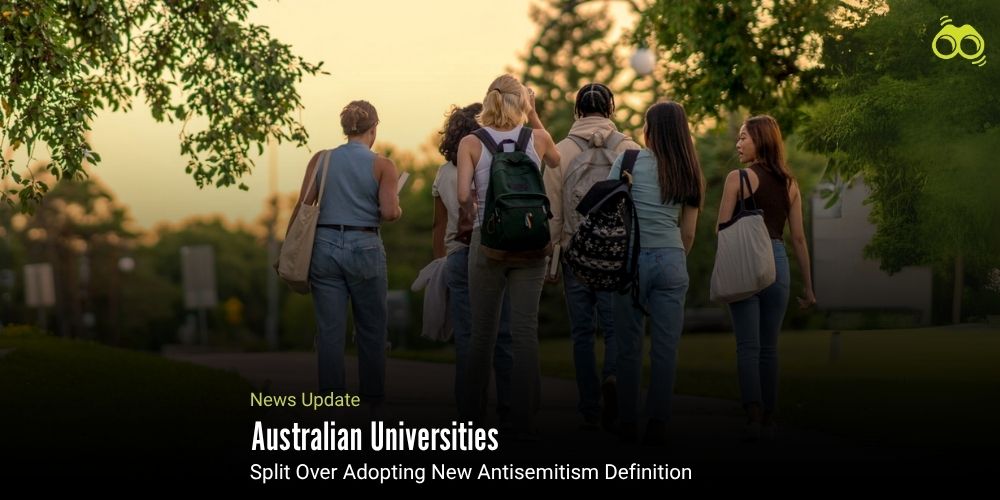Concerns Over Free Expression Delay Adoption of Antisemitism Definition in Higher Education
ANU Rejects UA Antisemitism Definition, Sparking Broader Discussion on Free Speech
Several Australian universities have been hesitant to adopt a newly introduced definition of antisemitism, citing concerns about its potential implications for academic freedom. The Australian National University (ANU) has reportedly become the first institution to formally reject the policy, while at least 11 other universities remain undecided. This reluctance underscores the broader debate surrounding academic integrity and institutional autonomy in addressing sensitive social issues.
The Universities Australia (UA) definition of antisemitism, which closely aligns with the International Holocaust Remembrance Alliance (IHRA) model, has faced criticism over fears that it may restrict free speech and academic discourse. Developed by the Group of Eight with input from antisemitism envoy Jillian Segal, the definition, endorsed in February by 39 vice-chancellors, states that criticism of Israel may be considered antisemitic if it employs harmful stereotypes, calls for Israel’s or Jews’ destruction, or attributes collective responsibility to Jewish communities for Israel’s actions. Furthermore, it notes that substituting “Zionist” for “Jew” can still be deemed antisemitic.
Opposition has emerged from key academic and student groups. The National Union of Students (NUS) and the National Tertiary Education Union (NTEU) have reportedly rejected the UA definition, citing concerns over its potential impact on academic freedom. Similarly, students at the University of Sydney voted against its adoption. Meanwhile, institutions such as UNSW, Deakin, and RMIT are awaiting guidance from federal education bodies to ensure the definition is aligned with academic standards and safeguards free expression.
Despite this ongoing deliberation, several universities continue to assess the UA definition within their policy frameworks. James Cook and Adelaide plan to review its applicability in upcoming policy discussions, whereas Charles Darwin is evaluating how to integrate it within existing academic freedom protections. Additionally, the University of the Sunshine Coast intends to examine the definition shortly, while Newcastle is consulting stakeholders on its potential implementation.
In contrast, the University of Queensland’s senate has endorsed the UA definition and is currently developing a broader antiracism framework. Meanwhile, ANU’s academic board reportedly declined to adopt the UA definition on 23 May, opting instead to support a comprehensive anti-racism strategy informed by a 2023 taskforce report. An ANU spokesperson confirmed that, while the academic board had recommended adopting a broader definition of racism to foster an anti-racism culture, final decisions ultimately rest with the university’s leadership. Although the UA definition was not explicitly rejected, discussions on the matter continue through established governance processes.
The rejection of the UA definition has drawn both advocacy and criticism. AUJS co-president Liat Granot reportedly urged ANU’s academic board to adopt the definition, arguing that its rejection has left Jewish students vulnerable, unsupported, and disillusioned. Describing it as their last hope for institutional protection, Granot emphasised the necessity of clear measures to safeguard students against antisemitism. Conversely, NTEU ACT secretary Dr Lachlan Clohesy reportedly encouraged ANU to reject the definition, warning that it risked conflating criticism of Israel with antisemitism. He further conveyed objections from Jewish NTEU members who opposed linking Zionism to Jewish identity, cautioning that the definition could lead to future disciplinary action against academic staff.
Similarly, the Executive Council of Australian Jewry (ECAJ) and the Australian Academic Alliance Against Antisemitism (5A) have reportedly urged the academic board to reconsider its stance, contending that a non-binding definition reflecting Jewish lived experiences is essential. However, they also questioned the academic board’s suitability to assess the UA definition, citing its focus on academic freedom rather than an anti-racism mandate. A spokesperson from Universities Australia reaffirmed the organisation’s respect for institutional autonomy in balancing student safety with free expression. While over 20 universities have yet to comment on the issue, it was clarified that the University of Queensland is finalising a broader antiracism strategy, rather than a specific position on the UA definition. The ongoing deliberations highlight the complexities of reconciling academic freedoms with protections against discrimination in higher education.
Editor’s Note:
The ongoing debate over the Universities Australia (UA) definition of antisemitism reveals deep tensions between safeguarding student welfare and preserving academic freedom. While institutions must ensure that campuses remain spaces free from discrimination, they equally bear the responsibility of upholding free expression and open debate. Critics argue that the UA definition risks conflating legitimate criticism of Israel with antisemitism, potentially deterring scholarly discussions on geopolitics and international policy. Academic freedom thrives on the ability to challenge dominant narratives, scrutinise policies, and engage in constructive discourse, principles that should remain protected. Conversely, proponents contend that adopting the definition would offer Jewish students essential safeguards against discrimination, ensuring universities remain inclusive spaces for all. The Australian National University’s decision to reject the definition in favour of a broader anti-racism framework exemplifies the complex balancing act universities face. With many institutions still undecided, it is clear that the conversation is far from over.
Skoobuzz emphasises that universities must tread carefully, ensuring that efforts to combat antisemitism do not inadvertently suppress scholarly inquiry, while also recognising the real concerns of students who feel vulnerable in an increasingly polarised climate.














0 Comments (Please Login To Continue)